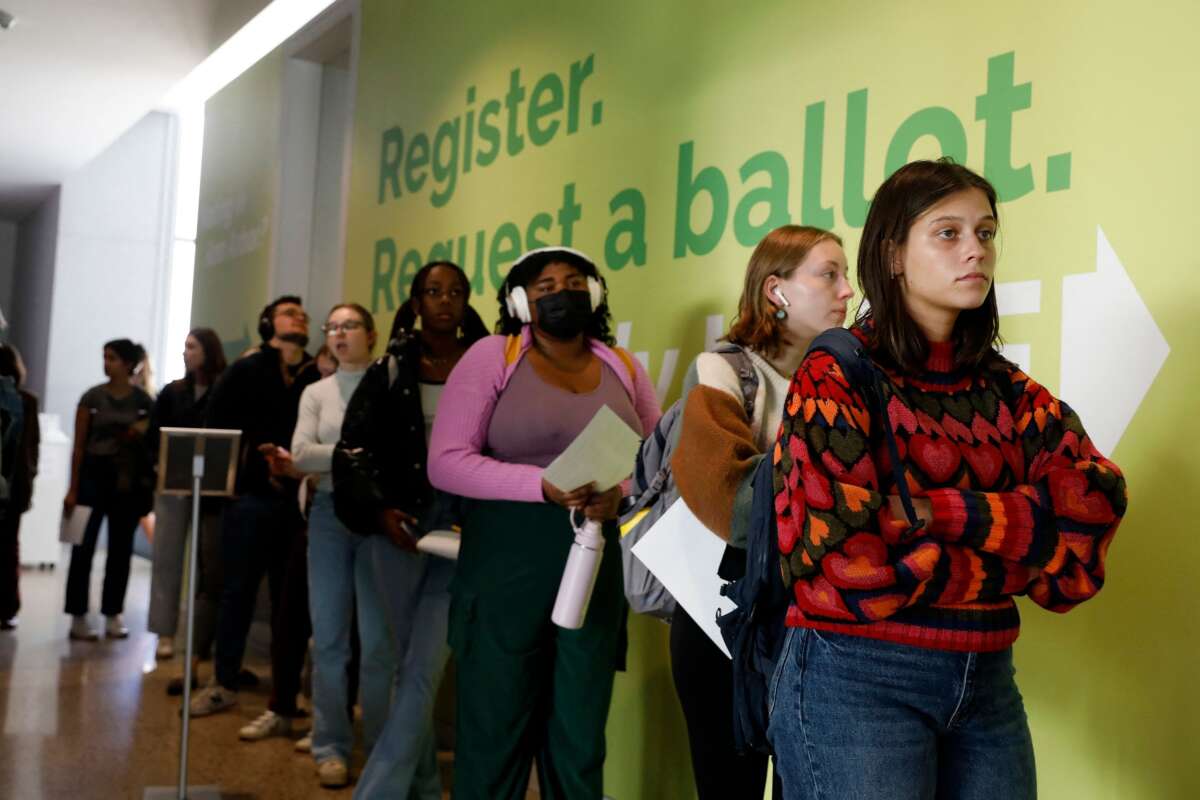Support justice-driven, accurate and transparent news — make a quick donation to Truthout today!
Businessman Vivek Ramaswamy, a longshot candidate for the Republican Party’s 2024 presidential nomination, tweeted his belief on Friday that some young people in the United States are undeserving of the democratic right to vote.
Ramaswamy went on to say that Congress should pass a constitutional amendment barring 18-25 year olds from voting, with some exceptions.
“Young people no longer value a country that they simply inherit,” Ramaswamy claimed in his tweet. “People value something more if they have a stake in creating. That’s why I’m proposing a constitutional amendment that requires 18-year-olds to pass a civics test or meet a national service requirement.”
Ramaswamy’s tweet included a link to his website, where he details his proposal.
Under Ramaswamy’s proposal, individuals between the ages of 18 and 25 would have to serve in the military for at least six months in order to be eligible to vote. Barring that, people within that age range could vote only if they served in a first responder role or passed a civics test similar to the one used for naturalization citizenship tests.
Notably, just 7 percent of the U.S. population has served in the military, and fewer than 2 percent of the populace is currently a first responder. Furthermore, a 2018 survey found that two out of every three American voters would fail the civics test that Ramaswamy is saying young adults should be required to pass.
The provisions of the Voting Rights Act of 1965 currently ban tests for voting, which were used to disenfranchise people of color for decades. Additionally, the 26th Amendment to the U.S. Constitution requires that states allow people to vote if they are 18 years of age or older.
Ramaswamy’s proposal, which would be a constitutional amendment, would overturn both standards, which have been in place for more than half a century. It’s unlikely that enough states would ratify the amendment for it to pass, but other Republicans have also expressed a desire to raise the voting age, following their party’s less-than-stellar showing in the 2022 midterm elections, which saw many young voters support Democratic candidates for office.
Notably, because Gen Z is more racially diverse than any other generation in U.S. history, restricting the voting rights of people in this age range would disenfranchise millions of nonwhite voters. These voters are also more likely to support LGBTQ rights or identify as LGBTQ than any other generation, and disrupting their ability to vote could result in state and federal governments that are more likely to impose homophobic and transphobic laws.
Just after the midterms, ACT For America chair and anti-Muslim commentator Brigitte Gabriel expressed her support for changing the threshold to vote. “Raise the voting age to 21,” she wrote on Twitter.
Fox News personality Jesse Watters also disparaged young voters after the midterm elections. “The fact that these youth voters are coming in so strong in an off-year is very concerning. It looks like they’ve been brainwashed,” he said.
Conservative radio host Peter Schiff has similarly called for raising the voting age. “Let’s raise the voting age to 28,” he said on his program last year. “If I was still 18 I’d support this.”
While it’s unlikely that Republicans will succeed in implementing changes to the voting age, GOP lawmakers in states across the country have proposed and passed a number of bills imposing voting restrictions that disproportionately impact young people. These laws include voter ID requirements that do not include college or university cards, mandates that bar polling places from being located on or near campuses, and the shortening of mail-in ballot deadlines, all of which make it harder for young people to vote.
Young people and organizations dedicated to empowering youth voters are fighting these efforts by filing lawsuits against voting restrictions, providing campuses with financial resources to help students overcome geographical barriers, and educating young people about efforts to curtail their rights.
Young people are much more civically engaged than Ramaswamy claimed in his recent social media posts, organizers for young voters say.
“There is so much power in voting, and for youth, there is an extraordinary commitment to voting,” said Maxim Thorne, CEO of Civic Influences, a nonprofit group that aims to help young people vote, speaking to Truthout’s Ngakiya Camara in February.
Trump is silencing political dissent. We appeal for your support.
Progressive nonprofits are the latest target caught in Trump’s crosshairs. With the aim of eliminating political opposition, Trump and his sycophants are working to curb government funding, constrain private foundations, and even cut tax-exempt status from organizations he dislikes.
We’re concerned, because Truthout is not immune to such bad-faith attacks.
We can only resist Trump’s attacks by cultivating a strong base of support. The right-wing mediasphere is funded comfortably by billionaire owners and venture capitalist philanthropists. At Truthout, we have you.
We’re in the midst of a fundraiser, and as of right now, we have until midnight to raise $10,000. Please take a meaningful action in the fight against authoritarianism: make a one-time or monthly donation to Truthout. If you have the means, please dig deep.
